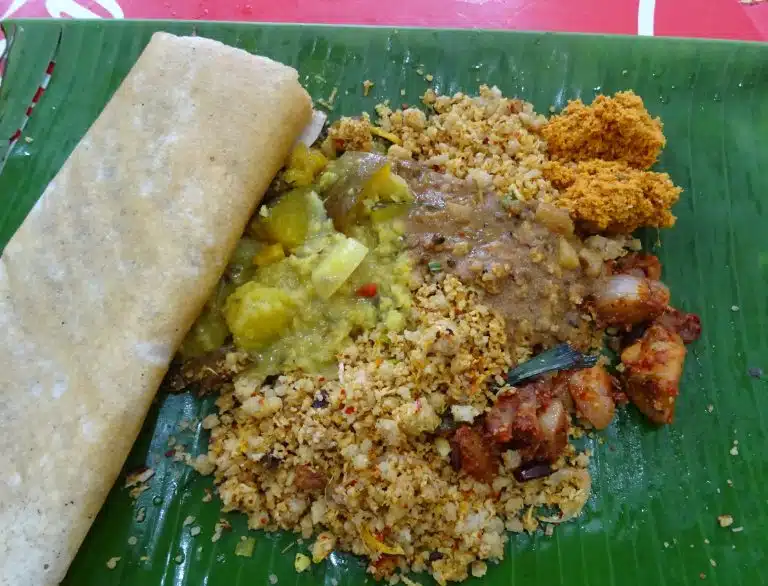First of all congratulations on being here!
You’ve come here looking for sustainable travel tips and that in itself is the first step towards greener travel. If you’ve somehow arrived to this web page and you’re not looking for sustainable travel tips then you should keep reading anyway.
Let’s face it, this is a bloody amazing world we live on and you’d be crazy not to want to explore it. The important thing is to make sure it stays amazing and that’s why these sustainable travel tips are so important. Not only will they help you protect your dream destinations they’ll also make your travelling experience all the more rewarding and quite often save you some money.
So, here are our top sustainable travel tips, passionately compiled by two tree hugging vegans
1. Don’t be rubbish
Littering is obviously bad news, it doesn’t matter where you are or how small it is, keep it with you until you find a bin. If a bin is overflowing then don’t just leave it beside the bin, wait and find an empty one. Tied rubbish bags are quickly ripped through by animals and before you know it you’ll be that person chasing bits of rubbish around the park.
2. Keep to the path
If you’ve gone on a hike the chances are it’s because of the beautiful surroundings – let’s keep it that way! With so many tourists wandering through parks and trails stumbling astray can be very bad for the environment. The trails are designated to stop hikers encroaching on important wildlife or habitats and also for your safety.
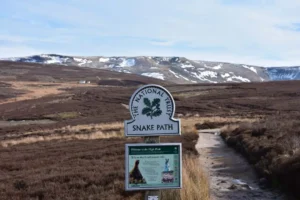
3. Biodegradable rubbish is still rubbish
How many times have you seen people throw banana peels or apple cores into a bush or a field? Just because it’s biodegradable doesn’t make it good for the environment and it definitely won’t be part of the natural food chain for animals. Keep it with the rest of your rubbish and wait until you find a bin.
4. Meet your new best friend, your refillable water bottle!
In hot climates, you need to drink at least 2 litres of water a day and those plastic bottles will add up if you’re buying them individually. Getting a reusable water bottle will save you a whole bunch of money and help you cut down on plastic use. Our big-time favourites are Tree Tribe stainless steel bottles which are a whole new level of awesome. They may be more expensive than your average bottles but they come with a lifetime guarantee, keep cold water cold and hot water hot and are plastic-free. On top of that with every sale Tree Tribe will plant 10 new trees which is pretty bloody cool!

5. If you buy a water bottle go for the biggest available
Drinkable tap water is a luxury that not every country has so it can be difficult to avoid using plastics all of the time. Buy the biggest bottles possible and keep them in your accommodation. You can even buy the bottles used for water stations and return them when you’re finished for it to be refilled and reused.
6. Not such a sanctuary
Although animal sanctuaries may seem like a harmless and rewarding experience for both you and the animals, approach with caution. Unfortunately in many countries animals are seen as a commodity and what is advertised as a ‘sanctuary’ may just be a money-making scheme. This has been made famous by the likes of Seaworld and Tiger Temple in Thailand where animals have been exploited for years. Trip Advisor is a good way to read reviews and decide if it seems legit and PETA have an awesome article about finding ethical wildlife sanctuaries. Remember that the best place to !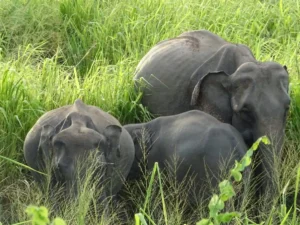
7. Plan ahead
Be aware of what you’re doing in the day and plan accordingly. If you’re going to a local market to buy foods then take a bag with you. If you know you’re going to be on the move all day, make sure you take your refillable water bottle.
8. Get yourself a canvas bag
These guys are light, easy to pack into your rucksack and will help you use less plastic bags. Single-use plastics are quite literally fucking up the world so we should all be taking steps towards greener options. If you want to find out more of the problems with plastic then check out this article.
9. Slow down
Travelling slowly is one of our favourite sustainable travel tips and probably one of our top travel tips overall. When you travel quickly you often end up taking the quickest and easiest options without the time to find the greenest choice. Slow down a bit, learn about your surroundings and environmental issues in the area and you can make more sustainable decisions.

Read more: check out these sustainable travel swaps to make travel more eco-friendly!
10. Think about your sun cream
Recent studies are showing that one of the key ingredients in suntan lotion is actually really harmful to corals and marine environments. That means every time you slap on the white stuff and jump in the sea it’s washing off and harming all our fishy friends. We’re not suggesting you go without suntan lotion just make sure you go with environmentally friendly versions and sustainable swimwear too.
For sun creams, our favourite is from Green People who make a whole bunch of organic and biodegradable cosmetics including a lovely sun cream. It doesn’t harm the ocean and they also donate money to the Marine Conservation Society. You can take a look at it here!
11. Take a rubbish bag with you
Don’t expect there to be rubbish bins conveniently placed everywhere, especially if you’re in the wilderness. Take a bag with you to keep your rubbish in until you get to a convenient spot. You can even pick up other litter that you see on the floor and improve the environment for everyone!
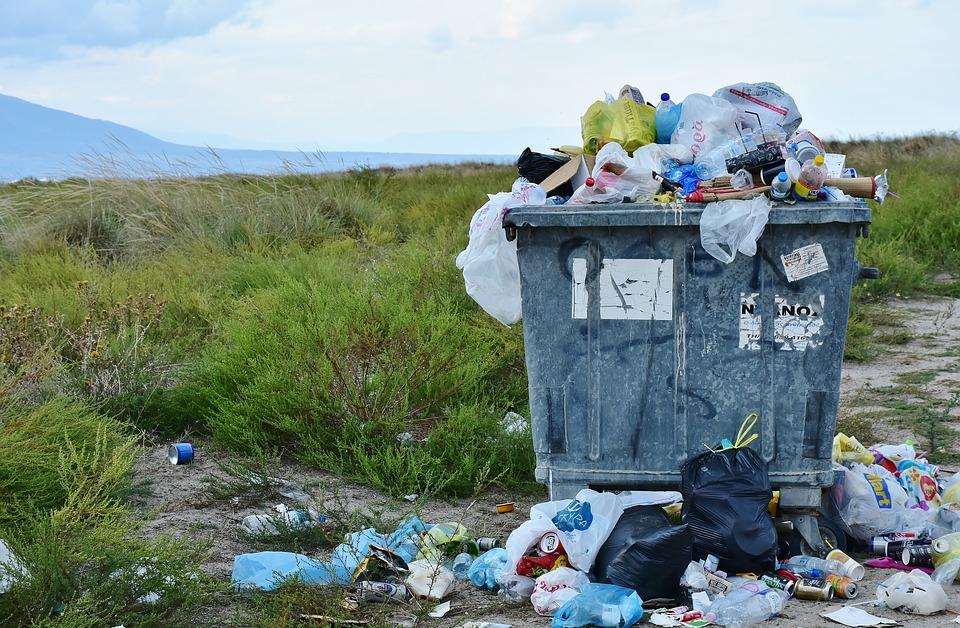
12. Do some research before you travel
Doing some research before is a crucial part of responsible travel. Most guidebooks and websites have sections for environmental issues so find out what they are and make sure you’re not contributing to them.
13. Get your tents out!
Not only is camping one of the best ways to experience your natural surroundings it’s also the greenest accommodation available. Once you’ve got yourself a good tent you’ll save loads of money and have a much wilder experience. The Vango Mirage is hands down the best tent we’ve used for the price. It’s light enough to take in a rucksack but will keep you sheltered through all 4 seasons and weather conditions, besides probably hurricanes… You can take a look at the tent here
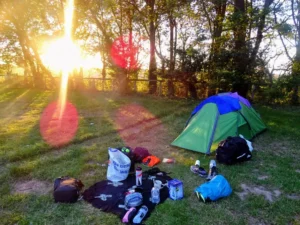
14. Consider a different time of year
Many smaller countries with soaring tourist numbers struggle to cope during peak seasons. Such big influxes during certain months can cause water shortages, social problems and a host of environmental issues. Consider travelling during shoulder seasons and your visit will be more relaxing and less of a burden on the country.
15. Pick your products wisely
Travelling can require a lot of equipment especially if it’s your first trip of it’s kind. Think about the gear you’re buying and try and find the most sustainable options. By far our most valued piece of gear has been our vegan hiking shoes which were great value, really comfortable and hard-wearing (find out more about them here). Sometimes, particularly with shoes, it’s worth spending a bit more for a pair that will last you. Take the time to find the right gear for you and you’ll save money in the long run.
16. It’s time to clip those wings
Switching to overland travel will help you see so much more of the country and help curb your carbon emissions. Flying has a hugely negative impact on the environment, that’s why we’ve committed to overland travel. This might not be possible for all people all of the time, so if you do decide to fly try and pick direct flights rather than layovers. The majority of carbon produced from flying is when the plane takes off – cutting out layovers can help cut this down.

17. Share transport
There are times when taxis are the quickest and most economical option but see if you can share your route. If you see other travellers or locals looking for a ride then ask where they’re going and buddy up. Hostels often have notice boards where you can advertise taxi journeys and find other passengers. A sustainable travel tip but also a way to save money and meet new people.
18. No engine? Great!
There are so many interesting transport options around the world try to pick one without an engine. It might not be the quickest but it will definitely be more of an adventure. Cycle, pedalo, sail, row, walk… there are so many options and your experience will be far more unique than just getting a bus from A to B.
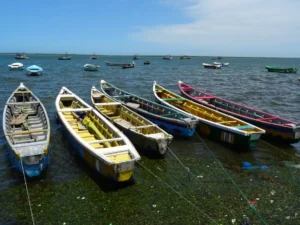
19. Volunteering can be life-changing but be careful…
Volunteering abroad can be a truly rewarding way to make your travels more sustainable. After a year working in a Marine National Park in Costa Rica, it massively encouraged me to pursue a life as an eco-warrior! However, this is another area where you should be careful as many organisation are not what they advertise. Here’s a very useful article for finding the right volunteer project when you go overseas.
20. Switch off
Travelling is a great time to switch off from the outside world and appreciate your surroundings. Switch off your electronics and immerse yourself in your travels. You’ll have a much more rewarding experience and won’t be using heaps of energy used to recharge your gear.
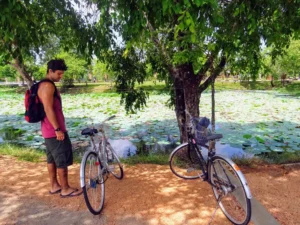
21. Invest in a solar charger!
If you’re working as you travel, going on multi-day hikes or you just can’t keep away from your electronics then invest in a solar charger. We picked the OUTXE power bank to keep our GPS powered during cycle tours and help us stay connected when working abroad. It’s water, dust and shockproof so you can strap it to your rucksack and let it charge whilst you’re on the move. It is a little heavy but when it’s fully charged it can juice your average smartphone 8-10 times. Overall it’s a top sustainable travel tip but also incredibly practical for when you’re off exploring.
22. Go local
The same rules at home apply abroad – eat local! Food miles have terrible environmental consequences and also mean the food won’t be as fresh. Eat locally grown, fresh food to cut down your carbon footprint and discover the local food culture. Why would you want to go abroad to eat the food from home anyway?
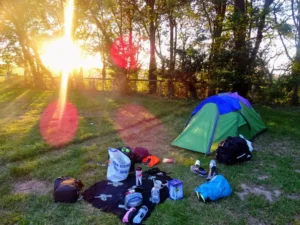
23. Share that shower!
So many of these sustainable travel tips are also good for making friends or improving relationships! Water is a scarce resource particularly in developing countries you may be travelling to. Sharing your shower will half the amount of water you’re using and improve the relationship with your shower partner!
24. What is so ‘eco’ about it?
Ecotourism is big business so don’t be too quick to believe what you read on the packaging. What makes your hostel an ‘eco-hostel’ or your tour an ‘eco-tour’? Enquire about their sustainable practices, most will be happy to tell and if not then perhaps you should choose a different option.
READ MORE: Ecotourism Experiences in Singapore
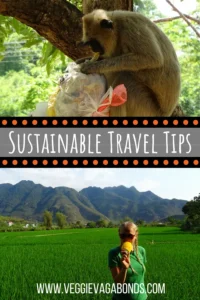
25. Locals know the best sustainable travel tips
Whilst there is a whole host of incredible knowledge on the internet the locals normally know best. If there are more sustainable travel options, protected areas or wildlife to be careful of the locals are the best people to ask. This is not just a great sustainable travel tip it will also help you learn about the local culture!
26. Don’t touch the coral
Something which seems obvious to some but a surprise to others. If you’re snorkelling or diving then don’t touch the corals! Our marine ecosystems are being damaged at such an alarming rate and all the human interference is not helping. Corals are living habitats and standing on, moving or touching any of it can be very harmful.
27. Leave the animals alone
Did you know that feeding bread to ducks is actually harmful? Unless there are signs that clearly state you can touch or feed animals then it should be avoided. Feeding wild animals can make them dependent on human food, which may be harmful to them, and can also encourage animals to grow too comfortable with humans. We should all opt for animal-friendly travel and remember: animals are in the wild for a reason, they can be as dangerous to us as we can to them!

28. Go natural
What better time to let it all hang out then when you’re travelling. Do you need to wear that makeup or put those chemicals in your hair? Even if you use ethical products it won’t be more ethical than no products at all.
29. Try local medicines
If you have a gushing cut on your arm or you’ve broken a bone then a hospital is probably the place you need to be. For smaller injuries or illnesses why not try some of the local medicines? For things like colds, upset stomachs and travel sickness most countries have local medicines and remedies. These are generally locally grown and sourced so you’ll skip out the international shipping and probably some plastic packaging too.
30. Go vegan
Well, this one was always going to be in here! The environmental impacts of the meat industry are shocking and just going vegan can be a great sustainable travel tip. If you’re not sure exactly why you should be vegan then take a read of this article.


Bonus tip – Speak up!
Last but not least this sustainable travel tip can make a really big difference. If you see other travellers littering, disturbing wildlife, standing on coral or doing anything that damages the environment then make sure you speak up. We’re not suggesting you go fully eco-warrior and chase them down the road with a club but just a friendly piece of advice can make a big difference. People are from all different walks of life and may be oblivious to things which seem obvious to you. Chances are they don’t realise and they’ll appreciate the information.

A Whole Bunch of Sustainable Travel Tips from Two Tree Hugging Vegans
Thank you for visiting this page. If you’ve read through these tips you’re doing your bit to keep this world beautiful! We’re all lucky to have so many exhilarating and diverse destinations and we’re even luckier to be able to explore them. Share these tips with your friends and family so we can all preserve this planet!
If you’ve got any more sustainable travel tips then please let us know in the comments box below!


